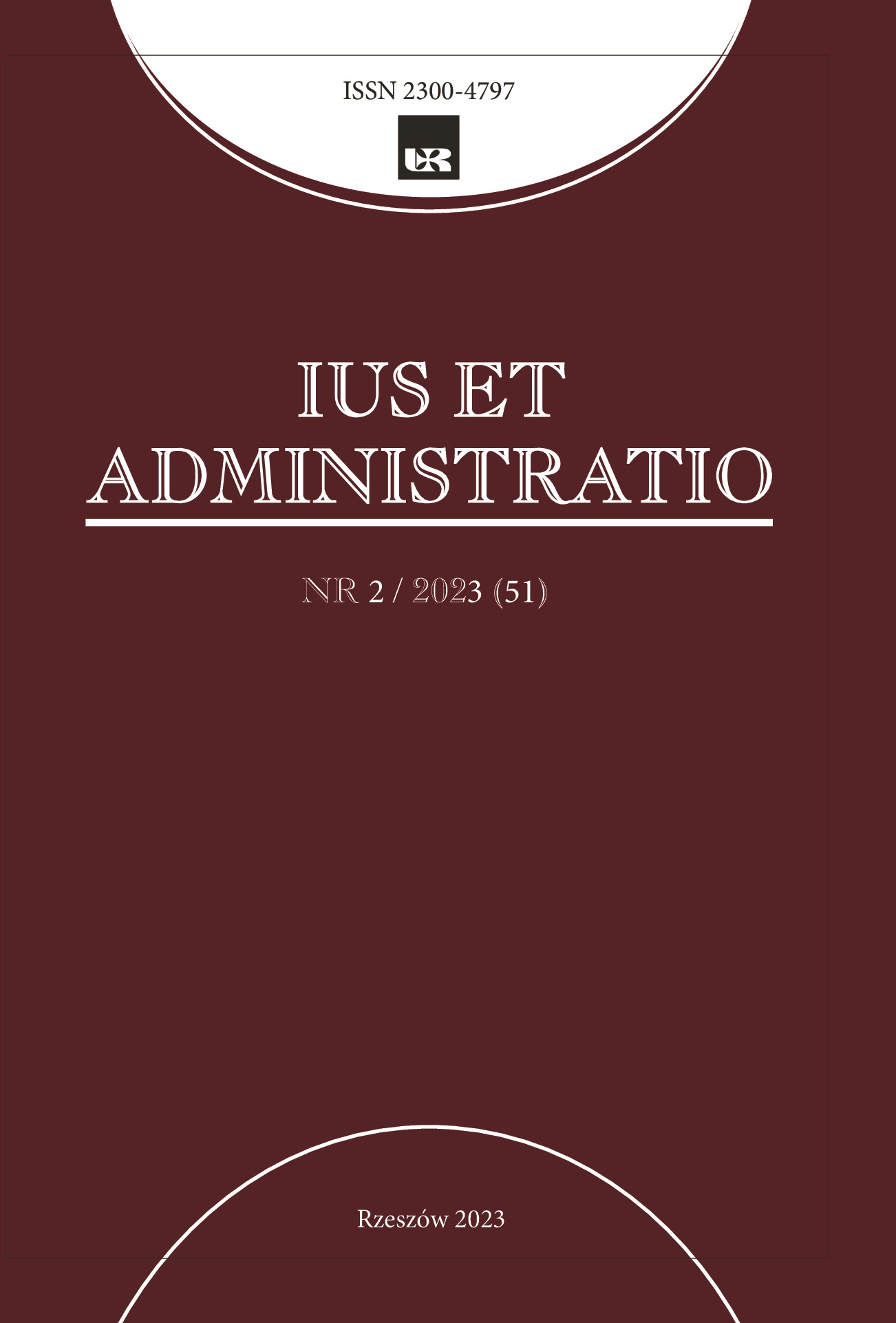At the routs of normative service administration according to the works of Tadeusz Pilat – progenitor of Polish administrative sciences
DOI:
https://doi.org/10.15584/iuseta.2023.2.10Keywords:
service administration, functions of public administration, science of administration, administration policy, science of administrative law, designates of the service administration, genesis of service administrationAbstract
According to the title of the article the authors analyze the works of Tadeusz Pilat dated 1880 looking for the genesis of contemporary normative service administration. Certainly, in the Times of Tadeusz Pilat, the very concept of „service administration” as a normative and doctrinal concept did not exist (described in details in the article), but its essence is related to the state and its administration. By the concept of normative service administration the authors understand the application of the designates of this concept in the content of bilaterally applicable legal provisions. Analysis of the academic script „Science of Administration According to the Lectures of Dr. T. Pilat. New Edition” published in Lviv in 1880 undoubtedly demonstrated that the designates of this concept function in his concept of the state, local government, science of administration and administrative law and play an important role in therein. These designations, in accordance with the natural concept of the commune shared by T. Pilat, are manifested first of all in the commune’s own tasks. In the authors’ opinion, the current concept of service administration has developed from non-equivalent service as a moral obligation to normative national regulations, including constitutional as well as international and European ones regarding public administration services to external subjects. These benefits are currently based not only on the form of legal interest but also on subjective public rights. Moreover, using public administration services is now not only a right, but also a public law obligation. On the part of the state, provision of such services and organization thereof, including privatization, should be linked to state’s obligations and liability.
Downloads
References
Beseler G., Volksrecht und Juristenstaaat, Leipzig 1843.
Bluntschli J.C., Duetsche Staatslehre fűr Gebildete, Nőrlingen 1874.
Błaś A., Boć J., Jeżewski J., Administracja publiczna, red. J. Boć, Wrocław 2003.
Błaś A., Zagadnienie zakresu zadań socjalnych administracji publicznej we współczesnym państwie liberalnym [w:] M. Giełda, R. Raszewska-Skałecka, Administracja publiczna wobec wyzwań i oczekiwań społecznych, Wrocław 2015.
Dąbrowski K., Administracja opiekuńcza: współczesna teoria i osiemnastowieczne treści [w:] Administracja opiekuńcza, red. M. Szreniawska, Lublin 2015.
Die Verwaltung als Leistungsträger, Kohlhammer Verlag Stuttgart-Berlin 1938.
Dobosz P., Administracja opiekuńczo-świadcząca w opatrznościowo-eudajmonistycznej wizji porządku demokratycznego państwa prawnego [w:] Administracja opiekuńcza, red. M. Szreniawska, Lublin 2015.
Eatwell R., Goodwin M., Narodowy populizm. Zamach na liberalną demokrację, tłum. W. Kurylak, Katowice 2020.
Filipek J., Prawo administracyjne. Instytucje ogólne, cz. I, Kraków 1995.
Izdebski H., Kulesza M., Administracja publiczna zagadnienia ogólne, Warszawa 1999.
Kasznica S., Polskie prawo administracyjne. Pojęcia i instytucje zasadnicze, wyd. II, Poznań 1946.
Knosala E., Stasikowski R., Typologia zadań publicznych (szkic z nauki administracji i prawa administracyjnego) [w:] Między tradycją a przyszłością w nauce prawa administracyjnego. Księga jubileuszowa dedykowana Profesorowi Janowi Bociowi, red. J. Supernat, Wrocław 2009.
Kumaniecki K.W., Langrod J.S., Wacholz Sz., Zarys ustroju, postępowania i prawa administracyjnego, Księgarnia Powszechna, Kraków–Warszawa 1939.
Nauka administracyi według wykładów Dra T. Pilata. Wydanie nowe, Nakładem Biblioteki Słuchaczów Prawa, Lwów 1880.
Nauka administracyi według wykładów Dra T. Pilata. Reprint, Wstęp merytoryczny I. Niżnik-Dobosz, P. Dobosz, Wydanie oryginalne, Lwów 1880, Nakładem Biblioteki Słuchaczy Prawa, Kraków 2023
Schmidt-Aßmann E., Ogólne prawo administracyjne jako idea porządku. Założenia i zadania tworzenia systemu prawa administracyjnego, tłum. A. Wasilewski, Warszawa 2011.
Szreniawski J., Wstęp do nauki administracji, Lublin 2002.
Ura E., Prawo administracyjne, Warszawa 2021.
Downloads
Published
How to Cite
Issue
Section
License
Copyright (c) 2023 Ius et Administratio

This work is licensed under a Creative Commons Attribution-NonCommercial-NoDerivatives 4.0 International License.

